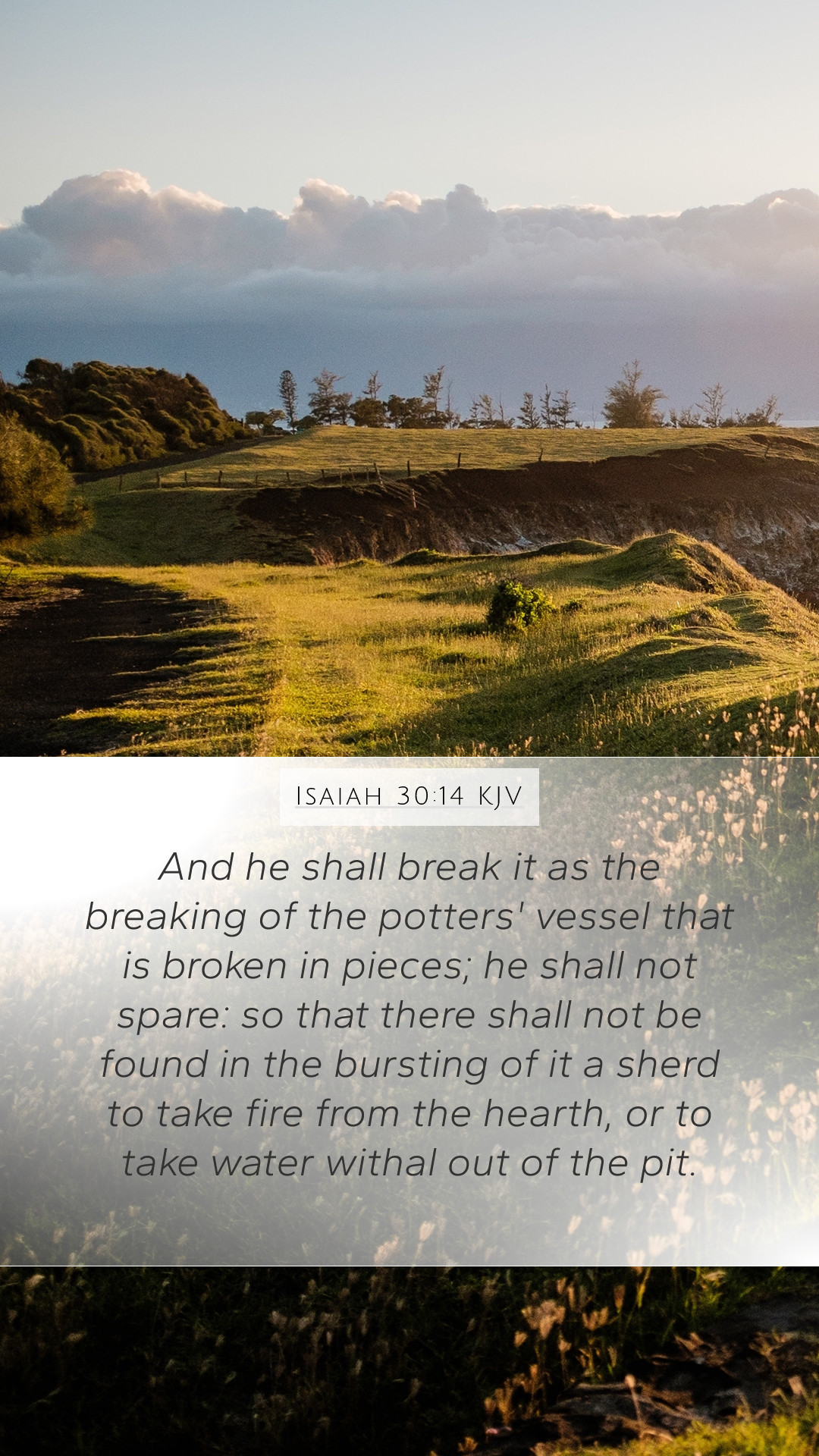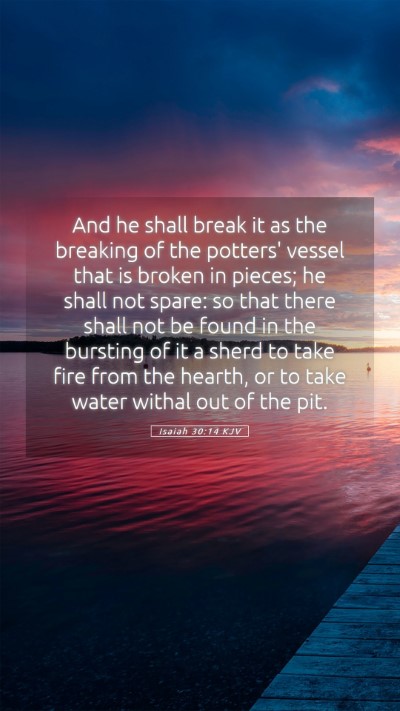Understanding Isaiah 30:14
Isaiah 30:14 is a poignant verse that speaks to the consequences of rejecting God's guidance and reliance on human strength and wisdom. This verse serves as a profound reflection on the fragility of human plans when they are not established on divine principles. The verse reads:
“And he shall break it as the breaking of the potter's vessel that is broken in pieces; he shall not spare: so that there shall not be found in the bursting of it a shred to take fire from the hearth, or to take water withal out of the pit.”
Meaning and Insights from Commentaries
To gain a deeper understanding of Isaiah 30:14, we can explore insights from established public domain commentaries, including those by Matthew Henry, Albert Barnes, and Adam Clarke.
1. Matthew Henry's Commentary
Fragility of Human Plans: Henry emphasizes that just as a potter's vessel is easily broken, so too are the plans of those who do not seek God’s approval. He points out that the verse illustrates the complete destruction of reliance on human wisdom when it stands against divine will.
- Destruction as a Warning: The breaking of the vessel serves as a metaphor for the ruin that awaits those who depend on worldly strength instead of divine guidance.
- Absence of Resilience: The imagery conveys a sense of hopelessness, as nothing remains of the vessel once it is destroyed, symbolizing the total futility of human efforts in the absence of God.
2. Albert Barnes' Commentary
God's Sovereignty: Barnes highlights this verse's assertion of God's supreme authority over the destinies of nations and individuals. He interprets the breaking of the vessel as an act of divine judgment against Israel for their rebellion and incomplete trust in God.
- Judgment and Accountability: The passage serves as a reminder of accountability to God. God's judgments, while severe, are also rooted in justice.
- Encouragement to Seek Divine Guidance: It encourages readers to seek God earnestly to avoid such destruction, advocating a relationship of trust and dependence on God.
3. Adam Clarke's Commentary
Symbolism of Utter Ruin: Clarke notes that the metaphor of the vessel portrays complete obliteration and the inability to recover anything of value from it. It symbolizes not just loss but complete destruction of what once had potential.
- Contextual Meaning: Clarke situates the verse within a broader narrative of calling Israel back to God amid their attempts to forge alliances with foreign powers, underscoring the need for reliance on divine strength.
- Encouragement to Repent: By recognizing their plight, Israel is invited to repentance, reinforcing the compassionate nature of God even amid judgment.
Historical Context
The context of Isaiah 30:14 lies in a period when the people of Israel sought alliances with Egypt rather than placing their trust in God. It reflects their ongoing struggle with faithfulness and the outcomes of their unfaithfulness.
Key Themes
- Divine Judgment: The verse serves as a caution against the repercussions of turning away from divine instruction.
- Human versus Divine Strength: A central theme is the futility of human efforts without God’s favor.
- Hope for Restoration: Although the judgment is severe, it signals an opportunity for redemption through genuine repentance.
Cross References
This verse correlates with several others that touch on these themes:
- Jeremiah 18:4: The potter metaphor emphasizes God's sovereignty over nations.
- Lamentations 4:2: The destruction of valuable possessions due to disobedience.
- Psalms 94:10: God as the sovereign judge punishing the nations.
Application to Daily Life
Isaiah 30:14 can serve as a profound reminder for contemporary believers regarding the importance of seeking divine guidance. Here are some practical applications:
- Seek God First: Before making decisions, believers should earnestly seek God's will through prayer and Scripture.
- Recognize Weakness: Acknowledge the limits of human wisdom and strength, which can lead to significant consequences.
- Pursue Restoration: Understand that even in the face of failure, repentance can result in renewed hope and grace from God.
Conclusion
Isaiah 30:14 serves as a powerful reminder of the fragility of human efforts when they are not aligned with God’s will. By studying this verse and its accompanying commentaries, believers can gain valuable insights about the importance of relying on divine strength, the significance of judgment, and the hopeful call to repentance.


